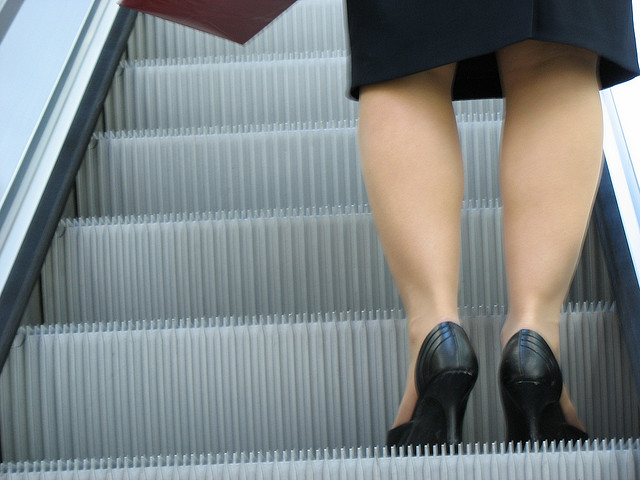ambivalence
/Looking back, I'm not entirely sure how March of Dimes became our cause in the aftermath of Gabriel's death. Perhaps it was because I had supported them before, perhaps it was because of the research they support and several friends with now-thriving preemies. Possibly it was because it was giant, far-reaching, recognizable, had to do with babies and was easy to explain. And of course, there hasn't been an organization devoted to helping families suffering from premature birth before viability due to malpractice and bad luck; not that I've found yet anyway.
There certainly was a drive that both my husband and I felt to do something, anything that could be in Gabe's name, in his memory, in his honor. Something that might emphasize his mark on the world, his importance to more than just the pair of us, some way to ensure that his very brief life was not forgotten. A vague feeling that if we could do some good, then it somehow made his death – not ok, never ok – but better? More palatable? More bearable? I’m not sure how the logic works, if it is present at all, but there is a visceral need to drag meaning and goodness out of the senselessness and personal tragedy of losing our son.
So immediate and necessary was that need that I now wonder if it wasn’t simply that March of Dimes was there. We began donating, twice a year, on his due date and his birthdate. We asked others who remembered him to do the same. It was easy, and if it didn’t vanquish the need to cement Gabriel’s legacy, well, would anything? I rather think it’s a lifelong struggle to remind others that I have a son, that he mattered and continues to matter.
I think, though, that what happened next was natural, if not inevitable, given what I’ve just written; I was approached by my new boss (a close former colleague) and asked if I would please, please attend a lunch. The lunch happened to be a kick-off to the annual March for Babies fundraising, which would culminate in the annual walk, held annually at my workplace. It’s something that my workplace takes very seriously, and each division is asked to form a team and raise funds and produce walkers. Because of the changes in leadership in our division, we’d had no team leader for two years and the division badly needed someone, and please, she begged me.
At first, I thought she was asking me because she trusts me, or because of my volubly expressed desire to be of help to her in any way, and despite a rising knot in my stomach at the thought of actually doing something more than simply donating, I tried to pass off a grimace as a smile and reluctantly agreed that free lunch was never a bad thing. She thanked me, relief written clearly on her face, and said something I regretted hearing: “Well, I know you and Jason donate every year since . . . well. Thanks.”
Ah, yes. Asking the one with the dead premature baby did make a lot of sense. The pit of dread in my stomach grew, and I questioned whether or not I really wanted to participate after all. But given that I’d committed myself, I attended that kick-off luncheon, agreed to be the fundraising team captain for my division. I also threw away, uneaten, the meal that was placed before me just as a child was paraded around at the front of the room; a child of the same age Gabriel would have been, born prematurely but now doing great! we were hastily reassured. After that he (naturally a he) was then taken to the back of the room and in the sort of torture that can’t be planned, let down to toddle and coo directly behind my seat. I listened with half an ear as the roomful of people spoke enthusiastically and proudly about their prior participation and how good it felt to be saving lives, all vaguely reminiscent of an olde-time tent revival. I wondered if there was anyone else like me struggling to breathe deeply and evenly, fighting back both tears and a panic attack. The knot of dread was growing into a full-blown ambivalence and I questioned what I’d gotten myself into.
That was only the beginning though; the ambivalence and uncertainty only increased from there. I felt like a fraud raising funds, as if I were trying to claim prematurity for our issue or blame it for our loss. While there is no denying that Gabriel’s premature birth was the cause of his death, I have never considered him a premature baby. There was never any hope of survival from the moment they finally determined me to be in active labor and dilated beyond four centimeters; innovations and advancements made in the last few years are astonishing, but not yet applicable to a twenty-one week old fetus. In a way, I was relieved, then and now, that we were spared the crushing decisions made alongside an incubator containing a tiny, fragile human. We never had to meet neurologists, worry about infection, be unable to touch our son, have to decide when a life hung in the balance what 'quality' really meant. We never had to choose between a shower or sleep and what might be the only time we had with our son; we knew we were down to minutes when the doctor left the room. In many ways, we felt lucky to have escaped the horror of the NICU experience. I never want to diminish that experience by claiming my son was a premature baby, by appearing to take a share of a world to which we never belonged.
Added to that churning internal struggle and growing conviction that this did not feel right to me was a curious request. The division leader, a very Important Person, had taken an interest in the MoD campaign. Suddenly, there was pressure to produce a viable fund-raising strategy, to get the word out, to recruit walkers, to do more than simply meet the absurdly low goal that had been set. I was asked to meet with the division’s communications coordinator to make a plan and she asked why I’d volunteered. She was relatively new and I didn’t work closely with her, so she didn’t know. After I delivered a terse, short version of events, saying we were doing this for our son, she teared up. And then her face lit up and she asked me if I would share my story, because it would really help the fund raising efforts to personalize it.
The ambivalence ratcheted up ten levels and morphed into tension and full-fledged anxiety. Share my story? Well, is that so hard? I do it all the time – here, on my blog, in real life. Gabriel has never been hidden away. And yet . . . something felt so wrong about this. Sharing our story is one thing, selling all we have left of our son for profit is quite another. But wasn’t I already trading in on him just by invoking his name? Wasn’t I saying I was doing this for him and asking relatives to donate for him? And, as my husband pointed out, wasn’t his story what we hoped to help prevent in someone else’s life by working with the March of Dimes? But it felt so wrong, so very wrong, as if she were asking me to write down how it feels when your heart is ripped out and shattered and your life irrevocably altered for general consumption, or worse, as a fundraising opportunity.
Begrudgingly, I considered it, wondering even then at the disquiet I felt. Finally I decided that if I were to write the piece, I could draw my boundaries. I could share his story on my terms. I wrote a carefully crafted 500 or so words in which I summarized our experience, crystallized our pain and touched on the ways I changed after why I felt it important to participate in things like the March for Babies. I handed it over, knowing it was my heart on a platter, and it was passed around to relevant people for approval. The reviews were lovely; it was poignant, concise, moving, sad. [I] had no idea how powerful a piece it was. Could [I] maybe make it into an appeal letter? My heart dropped, and though I tried, I could never do it. That crossed a personal line for me, one that may have been visible only to me or made sense only to me, but it was beyond my limit.
After that, whatever enthusiasm had initially appeared in the rush of a new project was buried under the uncertainty, anxiety and a growing resentment that I no longer wished to participate and had no recourse to change my mind. I'd made a commitment, I'd talked myself into believing that I was honoring Gabriel when my instincts were telling me this wasn't right for me. Then came two unexpected things that further derailed me. First was the Makena debacle. I refer you to tash’s blog for a good overview of that, if you happened to miss it. To be raising money for an organization that lobbied to support this sickened me. That particular drug – 17p – is supposed to be part of treatment protocol in my next pregnancy and may end up unavailable to me. I was infuriated, hurt, and felt deceived by March of Dimes for their vocal support of something that ultimately turned premature birth into a money-making venture for a big pharmaceutical company. While MoD subsequently retracted their support, claiming they had no knowledge of KV Pharmaceutical’s intentions, the damage had been done. I seriously considered pulling out at that point, but my husband remained earnestly eager to continue. For him, this entire experience was galvanizing, fulfilling. It was bringing him peace while I was left with an increasingly bitter taste in my mouth. The second thing was another chemical pregnancy, the third since losing Gabriel. It left me distracted, angry, hurt and depressed, and there was no energy left to spare for a cause I’d felt only a dubious connection with and that filled me with such unease. And of course, work was so busy and we were so short-staffed and in the end there were plenty of very reasonable reasons for my lethargy and dispassion.
As the walk drew closer, I grew more morose and short-tempered. It culminated a week ago in a big, ugly cry like I'd not had in months and finally the naked admission that I simply didn't want to go. I didn't want to be surrounded by women and children, by living reminders that we never had the choices or chances. I didn't want to be raising money for a cause that felt so removed from the reality of my loss. I didn't want to make sense or bring meaning out of the senseless and meaningless. I wanted to be there with my own symbol of hope in a prominently pregnant belly, or on my hip, or in my arms or not at all.
As a team leader I was terrible – we did no fundraisers, we never even sent out an email to the entire division. It was thanks only to my husband’s earnest efforts that my division did anywhere near as well as we did (he raised half our funds) and I was plagued with guilt over the poor job I'd done. I'd invoked my son's name, I'd proclaimed it was in his memory, and I'd done so little. Surely I could have exerted myself for Gabriel? Certainly I could have pushed aside the weary, tired litany of longings and regrets and done something brilliant and positive to really mark the importance of his life? But no, I could not bring myself to try, except for one or two occasions. I posted my piece on my blog, I asked a bunch of people I admire to retweet a link to my fundraising page. I passed my first goal, and set a higher one. All the while, I was trying desperately not to think about how not-right this whole endeavor felt to me. This world of prematurity . . . it wasn't Gabriel's, and it didn't feel like mine.
I tossed these questions over and over, all of last week, leaving me snappish and weepy by turns. I yelled at my husband Sunday morning, tears in my eyes, that I didn't want to go; I didn't want to do this. I drove sullenly, a hollow sort of brittleness surrounding me, and waited for the event to begin with a surliness that probably drove people away from me. Everywhere there were children, people, laughing, greeting each other, taking pictures. We took some as well; in each, I have a pained expression on my face, a clear wish to be done with this.
I did walk, my husband by my side. We didn't talk much of Gabriel, or our hopes for his sibling. We talked about the weather, the improvements to our workplace campus that we hadn't seen. We talked about how good he felt about doing this, and how foreign that felt to me. When we passed the butterfly garden – a grouping of large butterflies of different colors, each bearing a child's name – I couldn't hold back tears; he held my hand until we were beyond the sight of them. I looked forward to the ride home with an eager hope that once it was all behind me, I would finally rest more easily, perhaps feel better about it all.
Instead, the weight of that anxiety and the heaviness of misgiving only feels more settled on me, much like the weight of grief I carry. I am realizing now that the ambivalence is about so many facets of living after his death, and was exaggerated by choosing a cause that I am not fully aligned with. I think I just sort of went into it ignoring an uncomfortable feeling I should have listened more closely to, and hoping that it would make me feel better about losing Gabriel. That we'd have done something for him that makes a difference, makes the world a better place. And while it felt that way to my husband - he really got so much out of this - I came away realizing that not only did this exercise not make me feel better, I don't think any big thing will make me feel better about his death or more connected to him. I am learning, or maybe remembering, that for me, acknowledging the ways in which I've changed, the small daily things like remembering to appreciate beauty and understanding the fleetingness of life, are the moments in which I feel closest to him and most at peace with this strange after-life, that small actions directly benefiting those in need feel more right than big organizations. I think it's ok that this wasn't a transforming thing, and that it's ok to feel not great about it. I hope that saying - hey, I tried to honor my son and honestly, it didn't do what I hoped it would for me - may help someone else feel less guilty about their own search for meaning or their own ambivalence.
Have you become active in any similar organizations since losing your child? Has that been a healing experience for you, or did you experience similar feelings of discomfort or guilt? What things have you done to honor your children’s lives or memories that have brought you a sense of fulfillment or peace?





